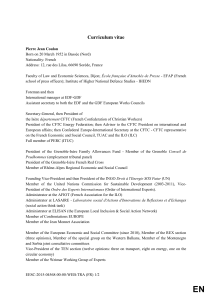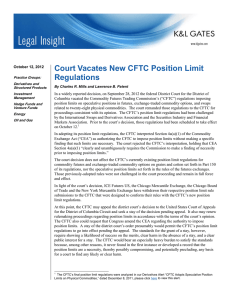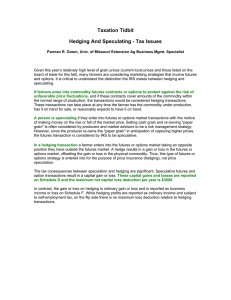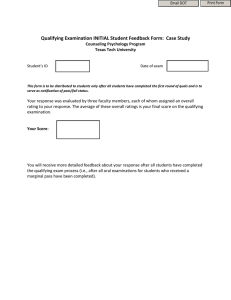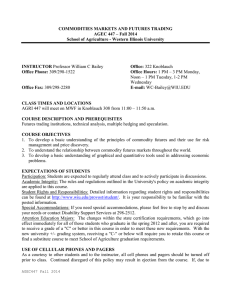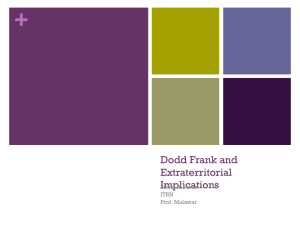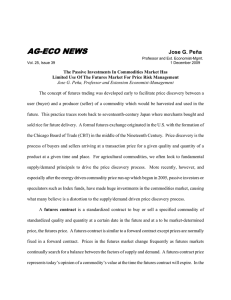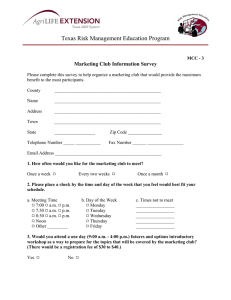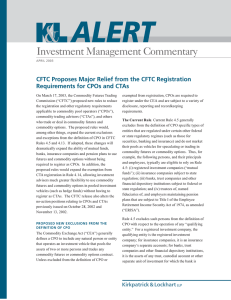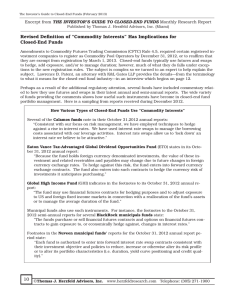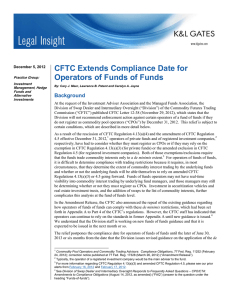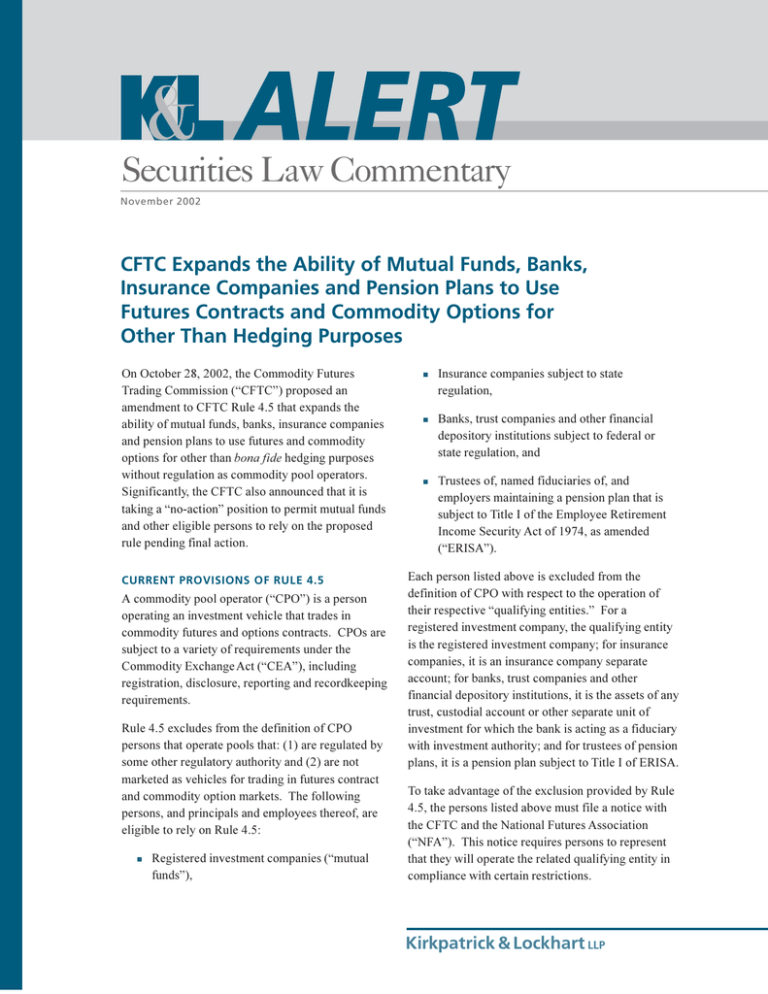
Securities Law Commentary
November 2002
CFTC Expands the Ability of Mutual Funds, Banks,
Insurance Companies and Pension Plans to Use
Futures Contracts and Commodity Options for
Other Than Hedging Purposes
On October 28, 2002, the Commodity Futures
Trading Commission (CFTC) proposed an
amendment to CFTC Rule 4.5 that expands the
ability of mutual funds, banks, insurance companies
and pension plans to use futures and commodity
options for other than bona fide hedging purposes
without regulation as commodity pool operators.
Significantly, the CFTC also announced that it is
taking a no-action position to permit mutual funds
and other eligible persons to rely on the proposed
rule pending final action.
CURRENT PROVISIONS OF RULE 4.5
A commodity pool operator (CPO) is a person
operating an investment vehicle that trades in
commodity futures and options contracts. CPOs are
subject to a variety of requirements under the
Commodity Exchange Act (CEA), including
registration, disclosure, reporting and recordkeeping
requirements.
Rule 4.5 excludes from the definition of CPO
persons that operate pools that: (1) are regulated by
some other regulatory authority and (2) are not
marketed as vehicles for trading in futures contract
and commodity option markets. The following
persons, and principals and employees thereof, are
eligible to rely on Rule 4.5:
n
Registered investment companies (mutual
funds),
n
n
n
Insurance companies subject to state
regulation,
Banks, trust companies and other financial
depository institutions subject to federal or
state regulation, and
Trustees of, named fiduciaries of, and
employers maintaining a pension plan that is
subject to Title I of the Employee Retirement
Income Security Act of 1974, as amended
(ERISA).
Each person listed above is excluded from the
definition of CPO with respect to the operation of
their respective qualifying entities. For a
registered investment company, the qualifying entity
is the registered investment company; for insurance
companies, it is an insurance company separate
account; for banks, trust companies and other
financial depository institutions, it is the assets of any
trust, custodial account or other separate unit of
investment for which the bank is acting as a fiduciary
with investment authority; and for trustees of pension
plans, it is a pension plan subject to Title I of ERISA.
To take advantage of the exclusion provided by Rule
4.5, the persons listed above must file a notice with
the CFTC and the National Futures Association
(NFA). This notice requires persons to represent
that they will operate the related qualifying entity in
compliance with certain restrictions.
Kirkpatrick & Lockhart LLP
The most significant of these restrictions is a
restriction on the use of futures contracts and
commodity options for other than bona fide hedging
purposes. The qualifying entity must represent that it
will limit the aggregate initial margin and premiums
required to establish such non-bona fide hedging
positions to 5% of the liquidation value of the
qualifying entitys portfolio, after taking into account
unrealized profits and unrealized losses on any such
contracts into which it has entered. (In the case of an
option that is in-the-money at the time of purchase,
the in-the-money amount may be excluded in
computing the 5% limitation.)
THE “NOTIONAL TEST”
The proposed amendment to Rule 4.5 creates a new
Notional Test for other than bona fide hedging
positions, which a qualifying entity may rely on as an
alternative to the 5% test. Under the Notional Test, a
qualifying entity must represent that the aggregate
notional value of its non-bona fide hedging futures
contract and commodity option positions does not
exceed the liquidation value of its portfolio, after
taking into account unrealized profits and unrealized
losses on any such contracts it has entered into. The
notional value is calculated for futures positions by
multiplying the size of the contract, in contract units,
by the current market price per unit. For options, it
is calculated by multiplying the size of the contract,
in contract units, by the strike price per unit. The
CFTC noted that the Notional Test may permit
greater use of non-hedge positions relating to equity
but may be more restrictive than the 5% test in
respect of the non-hedge positions relating to debt.
The proposing release provides some examples of
the calculation of the 5% test and the Notional Test.
As a result of the proposed amendment to Rule 4.5
and the CFTCs no-action position permitting current
reliance on the proposed amendment, qualifying
entities can choose to comply with the Notional Test
with respect to other than bona fide hedging
positions in lieu of the 5% test without the need for
making any additional filings or amended filings with
the CFTC and NFA. The CFTC noted that its noaction position would expire when the CFTC takes
final action on the rule proposal and that persons
must then comply with the final rule. However, the
CFTC stated that it would provide affected eligible
persons and qualifying entities with sufficient time
within which to comply with the criterion as
adopted.
Mutual fund sponsors who wish to rely on the
Notional Test should consider whether they must
amend their prospectuses or statements of additional
information (SAI) to reflect the expanded
permitted use of futures and options. In addition,
mutual fund sponsors should be careful to consider
whether reliance on the Notional Test would require
any change to the mutual funds fundamental or nonfundamental investment restrictions. (Fundamental
investment restrictions can only be changed by
shareholder vote while changes to non-fundamental
restrictions typically require only board approval.)
Because, as the CFTC notes, the final amendments to
Rule 4.5 may amend, supplement, or delete the 5%
test and the proposed Notional Test, it may be
prudent for mutual funds that have incorporated the
provisions of the current Rule 4.5 in their investment
restrictions to wait until the CFTC takes final action
to avoid duplicative board action.
CARY J. MEER
202.778.9107
cmeer@kl.com
ARTHUR C. DELIBERT
202.778.9042
adelibert@kl.com
CHARLES R. MILLS
202.778.9096
cmills@kl.com
MARC MEHRESPAND
202.778.9191
mmehrespand@kl.com
Kirkpatrick & Lockhart LLP
2
Kirkpatrick & Lockhart LLP maintains one of the leading investment management practices in the United States,
with over 60 lawyers devoting all or a substantial portion of their practice to this area. According to the April 2002
American Lawyer, K&L is a mutual funds powerhouse that represents more of the largest 25 investment company
complexes and their affiliates than any other law firm.
We represent mutual funds, insurance companies, broker-dealers, investment advisers, retirement plans, banks and
trust companies, private funds, offshore funds and other financial institutions. We also regularly represent mutual
fund distributors, independent directors of investment companies, retirement plans and service providers to the
investment management industry. In addition, we frequently serve as outside counsel to industry associations on a
variety of projects, including legislative and policy matters.
We work with clients in connection with the full range of investment company industry products and activities,
including all types of open-end and closed-end investment companies, funds of hedge funds, variable insurance
products, private and offshore investment funds and unit investment trusts. Our practice involves all aspects of the
investment company business: from organizing and registering open-end and closed-end funds, both as series and
individual portfolios, to providing ongoing advice and representation to the funds and their advisers, directors and
distributors.
We invite you to contact one of the members of our investment management practice, listed below, for additional
assistance. You may also visit our website at www.kl.com for more information, or send general inquiries via email
to investmentmanagement@kl.com.
BOSTON
Michael S. Caccese
Philip J. Fina
Mark P. Goshko
(617) 2613133 mcaccese@kl.com
(617) 2613156 pfina@kl.com
(617) 2613163 mgoshko@kl.com
LOS ANGELES
William P. Wade
(310) 5525071 wwade@kl.com
NEW YORK
Beth R. Kramer
Richard D. Marshall
(212) 5364024 bkramer@kl.com
(212) 5363941 rmarshall@kl.com
Robert M. McLaughlin (212) 5363924 rmclaughlin@kl.com
Loren Schechter
(212) 5364008 lschechter@kl.com
SAN FRANCISCO
Eilleen M. Clavere
David Mishel
Richard M. Phillips
(415) 2491047 eclavere@kl.com
(415) 2491015 dmishel@kl.com
(415) 2491010 rphillips@kl.com
WASHINGTON
Clifford J. Alexander
Diane E. Ambler
Catherine S. Bardsley
Arthur J. Brown
Arthur C. Delibert
Robert C. Hacker
Benjamin J. Haskin
Kathy Kresch Ingber
Rebecca H. Laird
Thomas M. Leahey
Cary J. Meer
R. Charles Miller
Dean E. Miller
R. Darrell Mounts
C. Dirk Peterson
Alan C. Porter
Theodore L. Press
Robert H. Rosenblum
William A. Schmidt
Lynn A. Schweinfurth
Donald W. Smith
Robert A. Wittie
Robert J. Zutz
(202) 7789068
(202) 7789886
(202) 7789289
(202) 7789046
(202) 7789042
(202) 7789016
(202) 7789369
(202) 7789015
(202) 7789038
(202) 7789082
(202) 7789107
(202) 7789372
(202) 7789371
(202) 7789298
(202) 7789324
(202) 7789186
(202) 7789025
(202) 7789464
(202) 7789373
(202) 7789876
(202) 7789079
(202) 7789066
(202) 7789059
calexander@kl.com
dambler@kl.com
cbardsley@kl.com
abrown@kl.com
adelibert@kl.com
rhacker@kl.com
bhaskin@kl.com
kingber@kl.com
rlaird@kl.com
tleahey@kl.com
cmeer@kl.com
rmiller@kl.com
dmiller@kl.com
rmounts@kl.com
cpeterson@kl.com
aporter@kl.com
tpress@kl.com
rrosenblum@kl.com
wschmidt@kl.com
lschweinfurth@kl.com
dsmith@kl.com
rwittie@kl.com
rzutz@kl.com
®
Kirkpatrick & Lockhart LLP
Challenge us.
®
www.kl.com
BOSTON
n
DALLAS
n
HARRISBURG
n
LOS ANGELES
n
MIAMI
n
NEWARK
n
NEW YORK
n
PITTSBURGH
n
SAN FRANCISCO
n
WASHINGTON
.........................................................................................................................................................
This publication/newsletter is for informational purposes and does not contain or convey legal advice. The information herein
should not be used or relied upon in regard to any particular facts or circumstances without first consulting a lawyer.
© 2002 KIRKPATRICK & LOCKHART LLP.
ALL RIGHTS RESERVED.

